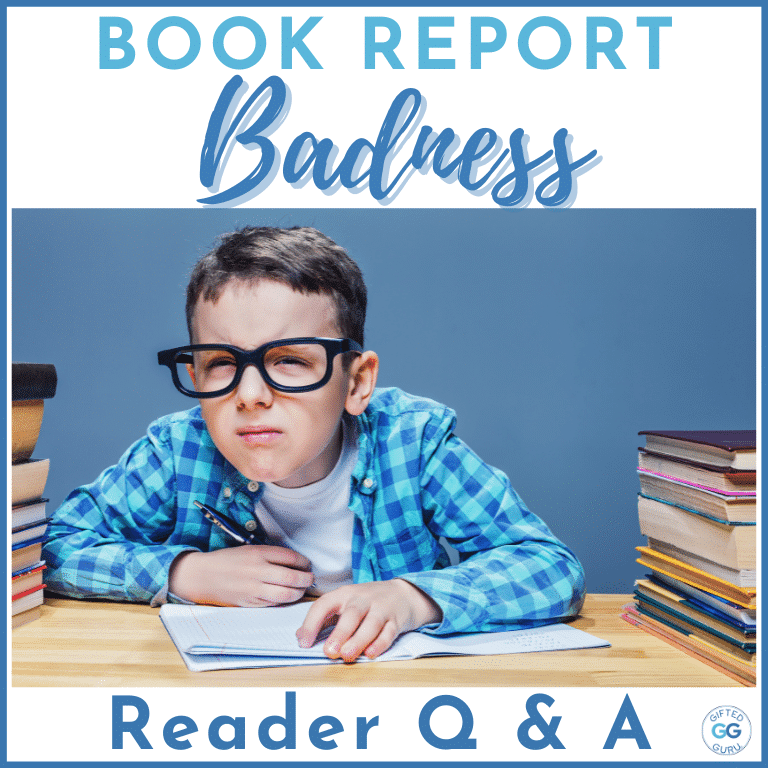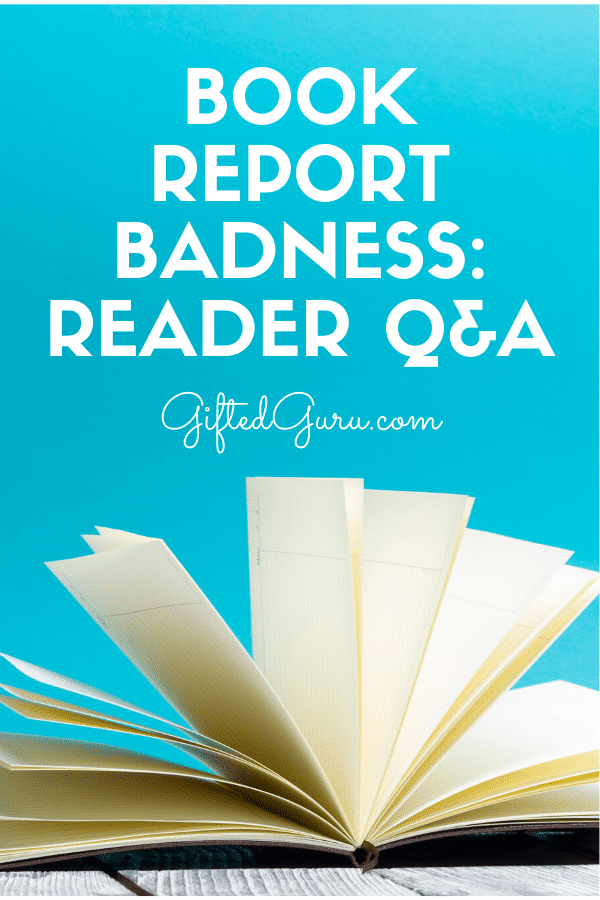Book Report Badness: The Trouble with Summarizing
There is always some tension between teaching a subject and making sure that we don’t turn the subject into a source of pain and drudgery. It’s the art of teaching (and parenting, really). I’ve written about it before when I talked about the role and importance of process.
I received an email about just this thing with regard to book reports that ask students to summarize every chapter of the book they’re reading. And we know that that’s what great readers want: they love to bring their reading to a grinding halt and summarize what they’ve just read. I mean, that’s what I do, don’t you? Yeah, not so much.
This isn’t an uncommon situation, so I thought it would be worthwhile to share my thoughts and some suggestions.
Note: Frequently I get questions from parents or teachers about their children and students. It’s frustrated me that I don’t have time to write back to everyone, and so I’ve decided to begin a “Reader Q & A” feature on the site. You can read through all of them if you would like to get practical suggestions for real-life issues.
If you have a question about your child, your student, best practices, or anything Giftedesque, shoot me an email or leave a comment, and we’ll see what we can do!
Here’s why the parent is concerned:
My son really struggles with the book report assignments that require the kids to write something after each chapter (Honestly all of my children have struggled with this assignment that have received it).
For my older children it impacted their love for reading and made both feel as though they do not want to read books anymore. For my son now I fear the very same thing is happening. We had more tears and frustration this morning again. I have suggested just reading an easy chapter book to do this assignment but he likes large books like Eragon and The Ranger’s Apprentice, and I think soon he will want to read The Hobbit, too.
Stopping to write in between chapters slows his thoughts and takes him out of the book and the story (I suppose for him it would be like starting and stopping a movie multiple times). When I was a child, I honestly would have cheated on an assignment like this just to get it done which kind of defeats the purpose of reading. I find myself holding back encouraging my son to do the same just to get it done and move one.
I get the assignment – I do think there is value in summarizing thoughts – I just wonder if it could not be accomplished in a different way. I guess I just fear watching yet a third child lose their love for reading from it.
If you have any thoughts in how best to approach the teacher I would love to hear them. I do not want to offend her or make her feel like the work is too much or inappropriate. I just want to maybe find some kind of happy medium because I know this assignment is coming his way next year and more routinely. The stress in his eyes this morning from it was difficult to see.
Looking at the problem with this type of book report assignment:
Any of us who are readers can see the problem here. When you’re reading an engrossing story, the last thing you want is to stop and write about it. That’s not fun! It’s work!
We can all relate. Let’s dive into the rationale behind this kind of activity and then look at what we can do to try to make it better.
Why do teachers do this kind of book report?
There are (at least) four reasons for a teacher’s asking a student to do this.
- Check for understanding. Especially if a child is reading a book that is challenging, the reader can get deeply into the book without realizing that he/she has completely lost track of key plot developments or doesn’t have a solid grasp of the characters. Once that happens, it’s very difficult to recover. Asking a reader to pause and check to make sure he/she knows what’s going on (demonstrated by a brief summary of the chapter) is intended to prevent this.
- Confirm that the child is actually reading. While it’s possible to cheat on this assignment (as the parent acknowledges), it can be intended to encourage actual reading, rather than copying a report.
- Slow a reader down. Language arts teachers aren’t just teaching kids to read for pleasure, although hopefully that happens, too. Most language arts teacher love to read, and they desperately want their students to love it, too. However, they’ve got a job to do that involves teaching analysis, not just skimming or pleasure reading, which is a different skill set. Being able to summarize what you’ve read is in the language arts standards for every year from kinder on. It’s a core, key, vital, mission-critical skill. Many readers, even strong ones, sometimes lack it. They can read, but they can’t summarize it effectively, and that bleeds into their writing, making them less effective writers.
- Habit or compulsion. It’s possible that the teacher may not have thought it out. She/he may have inherited a task from another teacher that she/he is simply using without really thinking about it. Another possibility here is that the teacher is compelled to use the assignment. A side effect of our current obsession with standards is that some teachers are being forced to use canned (usually horrible) curriculum.
Keep in mind that reading and analysis of an author’s writing are different skills that look the same to outsiders. I cannot tell you how many parents tell me that their child reads at x-grade level, not realizing that decoding and analyzing are only cousins to each other, not the same task.
How much your child likes to read has no guaranteed correlation with how well he/she is able to analyze text. I (and many other teachers) have had students who read like a house on fire but can’t analyze what they’ve read at anywhere close to the level they need to be able to do.
How can we solve this?
First, you need to find out the reason the assignment’s being given. Your response will have to respond to the reason.
Choose the intervention(s) below that you think are most likely to result in success.
- Self-adjust. This option does not even require the teacher to know about it. Let the child read through the book once for the storyline/fun, and then go back and skim it for the summaries of the chapters. This takes no more time, really. It’s just splitting the task, keeping the fun and tasks separated. This is the easiest intervention to use, although if you do have a skimmer who races through a book without really grasping it, it will backfire at first until they learn their lesson.
- If the purpose is to check for understanding, ask if the child can demonstrate that in another way. For example, can they record a quick summary using Flipgrid or similar technology?
- If the purpose is to teach summary, ask if the child can demonstrate mastery of the skill of summarizing separate from the skill of reading lengthy pieces. Summarizing can be taught without using novel-length books sectioned out by chapters. Strong students may already have mastered the skill for their grade level (teachers reasonably expect students’ summarizing skills to improve grade-over-grade), and should be excused from continuing to do it if it’s already mastered. Caveat: Just because a student can summarize once or twice, doesn’t mean it’s mastered. Parents may not know what level of summarizing is expected at the grade level, so you need to trust the teacher on the child’s acquisition and mastery of the skill.
- If the purpose is to slow the reader down and make sure they’re really reading, a simple knowledge and comprehension test should do it, and these are readily available for most texts used in schools.
- When the text is chosen by the student and the student is really enjoying it (as in the case of this reader’s question), the odds that a child won’t read the text are low, and the assignment increases, rather than decreases, that risk. In such a case, the parent and child can come up with a way to help the child prove to the teacher that the reading is being done.
- Help the child bifurcate the assignment from pleasure reading. Many of us do things for fun that we also have to do for work. It feels very different, even if it’s the same. For example, I send email to friends and for work. I read peer-reviewed journal articles for work, but that’s not what’s on my nightstand (usually). Same task, different experience. You can encourage the child to choose a book for skill development that is separate from the book for enjoyment. I still do this today. Explain that as their skills improve, they will bleed over into the books they read for fun, and they will enjoy those books even more than they do now (amazing!!!!).
Contacting the Teacher
I loved that the parent did not want to offend the teacher. I love mutual respect, and it’s becoming more and more rare in education, unfortunately.
If you want to choose an intervention that requires teacher cooperation, I’d send an email that says something along the lines of:
Dear Mr. Reading Teacher,
We’re so excited that Sam is reading so much for your class and for fun. We’re big readers in our family, and it truly makes me happy that he loves to read. One thing I’ve noticed is that he gets really engrossed in the book, and stopping after every chapter to write a summary of it seems to throw him off of his game. He loses his flow. I know there are important reasons for summarizing, and I’m wondering if we can work something out so that instead of that, he can do this….
What do you think?
Thanks again for all you do, and for considering this option.
Best wishes,
Super great parent
Wrapping Up:
Samuel Johnson, the great dictionarist, once said, “A man should read just as inclination leads him, for what he reads as a task will do him little good.”
While true, this is only possible once a child has actually learned how to read well. Johnson said “a man,” not “a child.”
A big part of enjoying literature is the skill we bring to it. This becomes increasingly true as we grow older and our reading becomes more complex. We get more out of books when we bring more to them.
The last thought I’d like to share on this is that no one task will drive a child’s love of reading out of him/her. Parents have tremendous power to keep the love of reading alive, even in the unlikely case that the teacher is doing it all wrong.
Having a family book club, reading aloud to children, filling the home with books, talking about books you’re reading, and many other bookish habits have more power than we sometimes realize.
You May Also Like:
- 11 Tips to Get Kids to Love Good Books
- How to Start a Book Club for Kids
- Why Children Stop Reading and What to Do about It
- Books for Gifted Kids
I send emails once or twice a month with all the goodness about gifted. Not getting them yet? Sign up and receive a free guide for helping gifted children thrive in school.

Note: Sometimes I use affiliate links, which means that if you click through and buy something, I get a few pennies (to buy more books!). It will never cost you anything extra.






